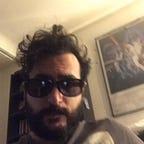Start your story with a BANG!
Why do people consume stories? For many reasons I’m sure, but one of the most important ones, if not the most important one, is entertainment. And as storytellers, our first goal should be to deliver just that, from the beginning of the story ‘till the end. Today we’ll talk about how to make our beginnings more entertaining.
Now more than ever our audience’s attention is being attacked constantly, between social media, multiple tabs opened on their laptops, and the almost infinite amount of shows, movies, and video games out there, it is practically impossible to capture their full concentration. So when they decide to read our watch YOUR story, you should hook them immediately. You may only have a few minutes to do so.
“Look, if you had one shot, or one opportunity
To seize everything you ever wanted, in one moment
Would you capture it, or just let it slip?” — Eminem.
Mr. Eminem is asking an important question here: if you have 5 minutes to hook your audience, would you hook them or would you let ’em slip?
Let me ask you this, do you ever watch movies made before the ‘90s? Or read books written a few decades ago? Then you must’ve noticed that the first acts of stories written before the 21st century are significantly longer than of stories written today. Modern audiences want the adventure to start immediately; they’ll get to know the characters as the story develops.
Let’s compare the beginning of The Lord of The Rings — The Fellowship of The Ring to its movie adaptation.
In the novel, the story begins with Bilbo’s birthday party, and if you don’t want to count chapter one, then the story begins with a prologue about Bilbo and Gollum.
They both serve as excellent introductions to the story, you get to know the characters before their troubles start, but they are definitely not explosive beginnings in any way shape or form. The reader has to keep going for a long while until the second act kicks in. I believe Bilbo’s disappearing act happens somewhere around page 40. I don’t think audiences would wait that long today.
Now, how does the film adaptation begin?
That’s right, DEATH! WARFARE! DESTRUCTION!
Peter Jackson knows that you have to hook the audience fast; the first scene of your story needs to be something your readers or watchers can really sink their teeth into.
Remember, entertainment is the name of our game, and we have to do it fast! How can you entertain the audience? My suggestion: Drama.
Objective + Obstacle = Drama.
But that’s not the only way to do it; at the beginning of a story, you can always use mystery or danger to create enough fun to keep the viewer hooked during the first act.
Breaking Bad begins with a flash-forward of a naked Walter driving like a mad man down a desert road. The scene not only has a character with an objective and an obstacle, but it also has a mystery: How did they get here? Audiences are hooked immediately. Great opening.
Steven Spielberg, being the master storyteller that he is, does something interesting in the opening scene of Jurassic Park. We get to see a group of workers transport a very deadly animal into a cage. We don’t see the animal, but we are witnesses to a vicus and fatal attack.
This scene builds dramatic tension for the rest of the story because we get to discover how dangerous the dinosaurs are, while the main characters don’t, and we still have the mystery of what these animals look like. We want to keep watching the film so we can see what will happen next.
Entertainment! That’s what we have to keep in mind as storytellers, let’s try to entertain the first page of the script to the last, since the first second of the movie to the credits roll.
Let’s craft great tales.
Do you want to know more about Storytelling? Then we have the right place for you! The e:course | Storytelling — The Collaborative Model, introduces you to the system of the Writers’ Room in the US and will show you how to adapt US creative principles to European realities.
Are you looking for something else? Great, we have more than 30 online courses taught by the best teachers the filmmaking industry has.
